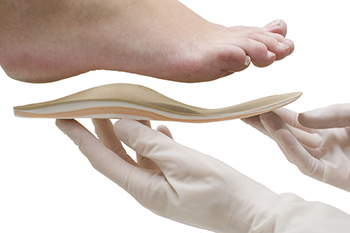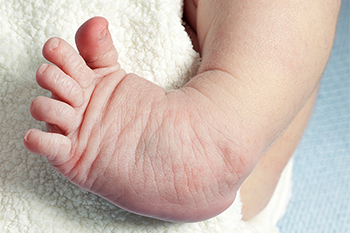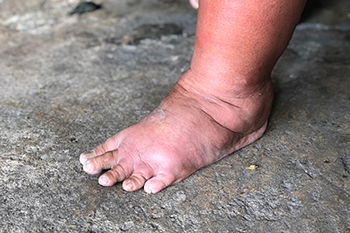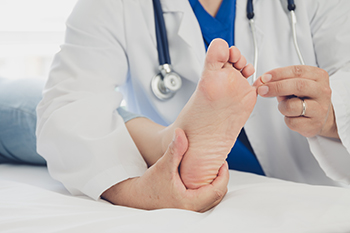283 St Rose Ave
Windsor, ON N8S 1X1
July 2022
Does Your Child Need Orthotics?

As a child grows and navigates their way through their youth, they may experience any number of foot problems. For example, your child may complain to you about having foot pain as a result of having flat feet. Consequently, your child might have sunken arches in their feet and turn their feet inward when walking. One important way in which you might be able to help improve the condition of your child’s feet is with orthotics. These custom-made shoe inserts can be made to exactly fit your child’s specific foot, and are made to help correct their gait. Namely, orthotics for children with flat feet are designed to have arch support cushions that encourage their feet not to collapse into the ground when walking. Additionally, orthotics for children with flat feet also have heel cushions that are intended to strengthen the ankles. These shoe inserts can be utilized in many different kinds of spacious footwear for children. Orthotics are not just for children – they have been effective in correcting the gaits of individuals of all ages as well. When it comes to protecting the health of your child’s feet, it is best not to take chances and to be proactive in preventing injuries. It is highly suggested to see a podiatrist for more information about orthotics.
If you are having discomfort in your feet and would like to try orthotics, contact the practitioners from Foot Care Institute. Our practitioners can provide the care you need to keep you pain-free and on your feet.
What Are Orthotics?
Orthotics are inserts you can place into your shoes to help with a variety of foot problems such as flat feet or foot pain. Orthotics provide relief and comfort for minor foot and heel pain but can’t correct serious biomechanical problems in your feet.
Over-the-Counter Inserts
Orthotics come in a wide variety of over-the-counter inserts that are used to treat foot pain, heel pain, and minor problems. For example, arch supports can be inserted into your shoes to help correct overarched or flat feet, while gel insoles are often used because they provide comfort and relief from foot and heel pain by alleviating pressure.
Prescription Orthotics
If over-the-counter inserts don’t work for you or if you have a more severe foot concern, it is possible to have your podiatrist prescribe custom orthotics. These high-quality inserts are designed to treat problems such as abnormal motion, plantar fasciitis, and severe forms of heel pain. They can even be used to help patients suffering from diabetes by treating foot ulcers and painful calluses and are usually molded to your feet individually, which allows them to provide full support and comfort.
If you are experiencing minor to severe foot or heel pain, it’s recommended to speak with your podiatrist about the possibilities of using orthotics. A podiatrist can determine which type of orthotic is right for you and allow you to take the first steps towards being pain-free.
If you have any questions please contact our office located in Windsor, ON . We offer the newest diagnostic and treatment technologies for all your foot and ankle needs.
Clubfoot Treatment Starts After the Baby Is Born

The foot condition known as clubfoot is considered to be a birth defect. It does not improve without treatment, and it is advised that a treatment program begin as early as possible. It is a foot structure deformity, and is present at birth. A noticeable sign that clubfoot is present consists of the baby’s foot turning in, forcing the bottom of the foot to face sideways. Research has indicated there are two types of clubfoot. The most common type is referred to as isolated clubfoot, and can happen when there are no other medical conditions. When other health issues and clubfoot exists, this is referred to as non-isolated clubfoot. Spina bifida can accompany clubfoot and is considered to be a birth defect of the brain, spine, and spinal cord. There may be factors that can increase the risk of having a baby born with clubfoot. These include having a baby boy, environmental factors consisting of the kinds of foods that are eaten, and genetic factors. Many pregnant women choose to have ultrasound tests performed, which can be helpful in detecting if clubfoot is present. A common treatment, which can be started after birth, is known as the Ponseti method. This consists of gently stretching the affected foot toward the correct position, followed by putting it in a cast. If your child has clubfoot, please consult with a podiatrist who can help to manage effective treatment options.
Congenital foot problems require immediate attention to avoid future complications. If you have any concerns, contact the practitioners of Foot Care Institute. Our practitioners can provide the care you need to keep you pain-free and on your feet.
Congenital foot problems are deformities affecting the feet, toes, and/or ankles that children are born with. Some of these conditions have a genetic cause while others just happen. Some specific foot ailments that children may be born with include clubfeet, polydactyly/macrodactyly, and cleft foot. There are several other foot anomalies that can occur congenitally. What all of these conditions have in common is that a child may experience difficulty walking or performing everyday activities, as well as trouble finding footwear that fits their foot deformity. Some of these conditions are more serious than others. Consulting with a podiatrist as early as possible will help in properly diagnosing a child’s foot condition while getting the necessary treatment underway.
What are Causes of Congenital Foot Problem?
A congenital foot problem is one that happens to a child at birth. These conditions can be caused by a genetic predisposition, developmental or positional abnormalities during gestation, or with no known cause.
What are Symptoms of Congenital Foot Problems?
Symptoms vary by the congenital condition. Symptoms may consist of the following:
- Clubfoot, where tendons are shortened, bones are shaped differently, and the Achilles tendon is tight, causing the foot to point in and down. It is also possible for the soles of the feet to face each other.
- Polydactyly, which usually consists of a nubbin or small lump of tissue without a bone, a toe that is partially formed but has no joints, or an extra toe.
- Vertical talus, where the talus bone forms in the wrong position causing other bones in the foot to line up improperly, the front of the foot to point up, and the bottom of the foot to stiffen, with no arch, and to curve out.
- Tarsal coalition, when there is an abnormal connection of two or more bones in the foot leading to severe, rigid flatfoot.
- Cleft foot, where there are missing toes, a V-shaped cleft, and other anatomical differences.
- Macrodactyly, when the toes are abnormally large due to overgrowth of the underlying bone or soft tissue.
Treatment and Prevention
While there is nothing one can do to prevent congenital foot problems, raising awareness and receiving neonatal screenings are important. Early detection by taking your child to a podiatrist leads to the best outcome possible.
If you have any questions please feel free to contact our office located in Windsor, ON . We offer the newest diagnostic tools and technology to treat your foot and ankle needs.
What Swollen Feet Might Mean

Peripheral edema is another name for swollen feet. It is a gathering of fluid in the tissue of the feet. Swollen feet might be a sign that something is happening in your body that requires attention. Because feet are so important to our mobility and functioning, taking care of them is crucial. Swollen feet might be caused by prolonged inactivity, walking for too long, being in hot or humid weather, hormone fluctuations, pregnancy, a foot injury (sprain, fracture, torn ligament, or tendon), or a serious underlying medical condition. Arthritis, lymphedema, congestive heart failure, deep vein thrombosis, a bacterial infection, or kidney disease are all serious health conditions that can result in edema. If your feet are swollen and you do not know why, if you are in pain, or if you have a medical condition that can cause swollen feet, please consult with a podiatrist who can help you get to the root of the problem, and provide proper treatment.
Swollen feet can be a sign of an underlying condition. If you have any concerns, contact the practitioners of Foot Care Institute. Our practitioners can provide the care you need to keep you pain-free and on your feet.
Swollen feet are a common ailment among pregnant women and people who stand or sit for extended periods. Aging may increase the possibility of swollen feet and patients who are obese often notice when their feet are swelling too. There may be medical reasons why swollen feet occur:
- Phlebitis - A condition that causes the veins to become inflamed and can also cause leg pain.
- Liver disease - This may lead to low blood levels of albumin which is a protein. This can cause fluid in the blood to pass into the tissues and several areas of the body can become swollen.
- Heart failure - When the heart doesn’t pump properly the blood that is normally pumped back to the heart can pool in the veins of the legs causing swollen feet.
- Kidney disease - One of the main functions of the kidneys is releasing excess fluid in the body. This type of condition can make it difficult for the kidneys to function properly, and as a result the feet may become swollen.
- Deep-vein thrombosis (DVT)- This is a serious condition where blood clots form in the veins of the legs. They can block the return of blood from the legs to the heart which may cause the feet to swell. It is important to be treated by a podiatrist if this condition is present.
Swollen feet can also be caused by bone and tendon conditions, including fractures, arthritis, and tendinitis. Additionally, there may be skin and toenail conditions and an infection may cause the feet to swell. Patients who take medicine to treat high blood pressure may be prone to getting swollen feet.
Many patients elevate their feet to help relieve the swelling and this is generally a temporary remedy. When a podiatrist is consulted the reason behind the swelling can be uncovered and subsequently treated.
If you have any questions please feel free to contact our office located in Windsor, ON . We offer the newest diagnostic tools and technology to treat your foot and ankle needs.
Why Live with Pain and Numbness in Your Feet?
Mandatory Education for Podiatrists

Podiatrists have the letters DPM following their name after they have completed all required education. It is an abbreviation for Doctor of Podiatric Medicine and these types of specialists treat ailments of the foot and ankle. Their mandatory education consists of completing four years of college to obtain a bachelor's degree, followed by four years of training in a podiatric college. A hospital residency is next for continued education where studies involve intense training on feet, ankles, and the conditions associated with them. The entire length of school is a minimum of seven years and may be followed by pursuing a fellowship. If you have a specific foot condition that needs treatment it is beneficial to schedule an appointment with a podiatrist who can effectively diagnose and offer correct treatment techniques rather than an MD who does not specialize in the feet. If this is a career choice you may be considering, visiting with a podiatrist is a good opportunity to decide if this is a desired field of medicine for you.
If you are dealing with pain in your feet and ankles, you may want to seek help from a podiatrist. Feel free to contact the practitioners from Foot Care Institute. Our practitioners can provide the care you need to keep you pain-free and on your feet.
What Is a Podiatrist?
A podiatrist is a doctor of podiatric medicine who diagnoses and treats conditions of the foot, ankle, and related structures of the leg. Your podiatrist may specialize in a certain field such as sports medicine, wound care, pediatrics, and diabetic care. Podiatrists have the ability to become board certified through training, clinical experience, and then taking an exam.
What Do Podiatrists Do?
On a daily basis, a podiatrist may perform the following activities:
- Diagnose foot ailments such as ulcers, tumors, fractures, etc.
- Use innovative methods to treat conditions
- Use corrective orthotics, casts, and strappings to correct deformities
- Correct walking patterns and balance
- Provide individual consultations to patients
It is very important that you take care of your feet. It’s easy to take having healthy feet for granted, however foot problems tend to be among the most common health conditions. Podiatrists can help diagnose and treat a variety of feet related conditions, so it is crucial that you visit one if you need assistance.
If you have any questions please feel free to contact our office located in Windsor, ON . We offer the newest diagnostic and treatment technologies for all your foot and ankle needs.









